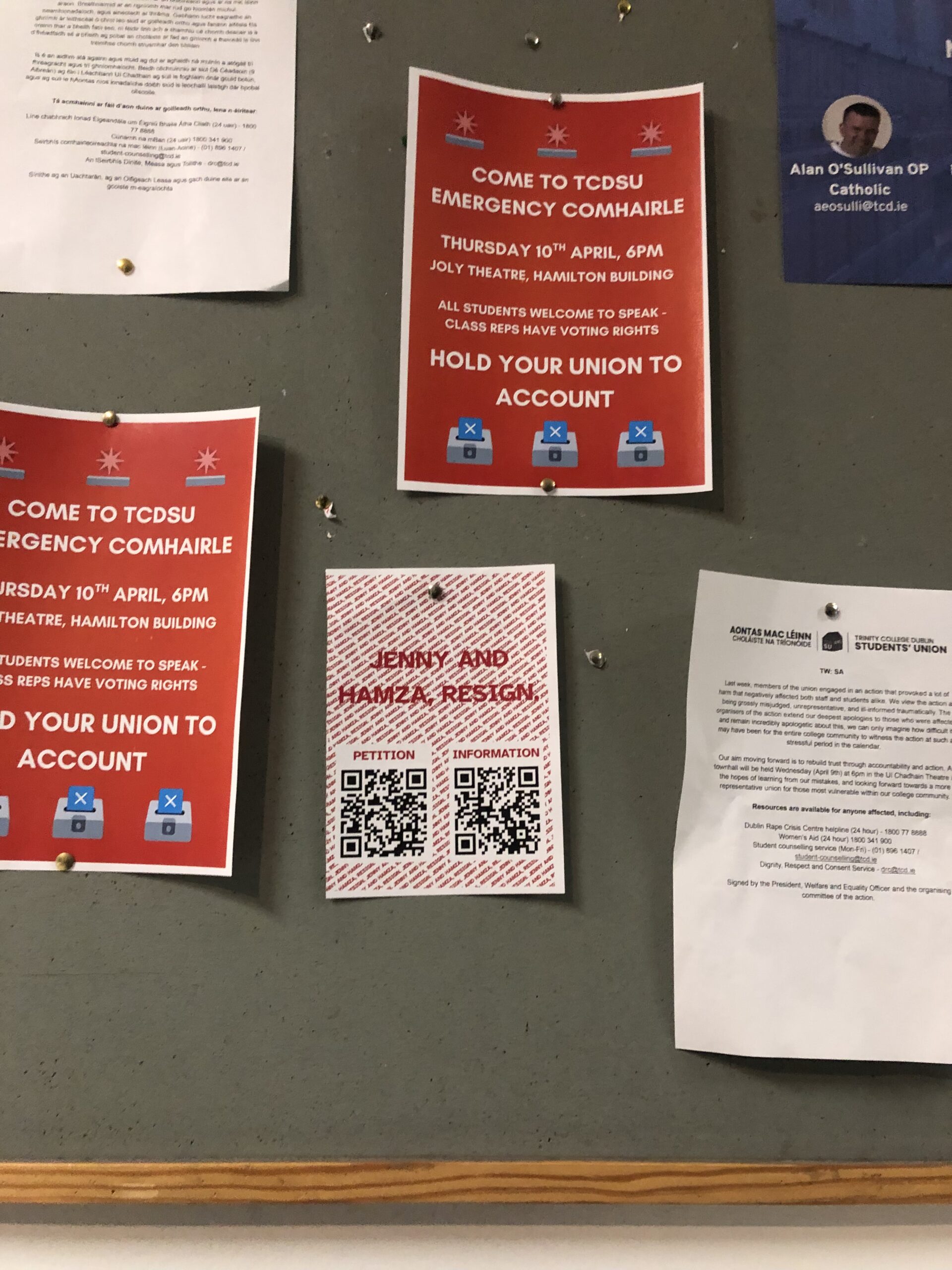The following article discusses sexual violence and racism.
Trinity College Dublin Students Union hosted a town hall following a widely criticised campaign about sexual violence that was defined by unanswered questions, a divided union, and no apologies.
Maguire originally proposed a campaign involving a sign accusing the college of protecting rapists. “We need something about calling them a rapist.” As the campaign evolved over a period of four months, it considered “about ten different ideas” The membership of the group was unclear, despite members being directly asked for several times over the course of the town hall. Apparently, it started with “about 20 people in Union Forum” and then there was “rambunctious debate” and it was determined that there should be a smaller group “of about eight”. That smaller group dissipated, and then a group “of five or six” was created.
Maguire repeatedly distanced herself from the final decisions: “I was a guest star”, she said “I hopped in and out…I only went to a handful of meetings”. Maguire’s framework wavered between being an institutional leader and an uninvolved participant. When asked by Trinity News Editor David Wolfe why no minutes were taken of any meetings of this “smaller group” Maguire said, “No…I don’t know. It wasn’t done. We were focused on the organisation of the actions”, acknowledging, “We should be taking minutes for all meetings, including committees that aren’t committees”.
Despite distancing herself from the organising group, Maguire confirmed the campaign was promoted via her personal Instagram account in a collaborative post, alongside Bana’s. When asked by The University Times if she would issue a personal apology, she replied “The TCDSU apology is my apology” continuing “when my job starts and begins […] it’s hard to detach”. Later in the discussion, she contradicted herself, saying “Jenny Maguire the person” has a different perspective and “my personal opinion is private”. She said “as the head of an organisation of 22,000 students, [this campaign] was unrepresentative.”
Bana explained that the effigies were not hung by the neck, as was originally planned, to avoid “looking like a suicide”, instead choosing to hang them upside-down. When asked if the action resembled lynching, Bana paused. Wolfe followed up: “So not self-inflicted?” Bana: “not inflicted by others, there’s a racial thing there.” Wolfe pressed on “Racial issues came up: lynching of racial minorities based on sexual abuse allegations… there’s a strong association there.” Maguire deflected: “The idea [was] to get attention of it without bringing up individual attention to it…put fear back on rapists.”
When asked if the Union condones violence, Maguire said “Violence should be a broader discussion…Housing insecurity is violence, class struggle is violence” so “no”.
Former TCDSU president László Molnárfi criticised the campaign as reckless and legally unsound: “this is not a rational campaign…we have to respect due process considerations in Irish law for slander and libel.” Molnárfi argued the campaign risked “destroying” legal protections for survivors by undermining due process entirely. “Unfortunately, no, not unfortunately, everyone deserves due process.”
When asked by an audience member if not allowing for protections for the accused could “hurt survivors, because false accusers co-opt language and spaces made for survivors” Maguire responded “Yes, tea. Sorry, I’m gay. That’s the point, it should centre survivors.”
Multiple audience members questioned how survivors were helped by the campaign, and how TCDSU measures the success of campaigns in general. Maguire admitted: “There’s no way to measure this”.
When Bana was asked about the role welfare plays in consent training, he said all consent training happens through the DRC. When pressed, given that the DRC is the organisation TCDSU was protesting, Maguire said “there have been no complaints about consent training.” When Bana was asked where these consent training sessions happen, he said “I have pushed for them to be on campus, they have been on campus”. When asked how many consent training sessions have happened, he said “I don’t know”.
When asked if she would resign, Maguire said “I will not be resigning. I welcome whatever action the members of the Union deem necessary for me.” Gilroy ended highlighting the emergency council meeting on Thursday 10th April, where three motions will be tabled: the Censure of Welfare and Equality Officer Hamza Bana, the Censure of President Jenny Maguire, and the creation of an ad-hoc task force on sexual violence.
Gilroy reiterated the importance of student feedback: “Hold your union to account…any sort of campaign or action is fully informed based off the experience of our members.” However, he acknowledged: “The action that followed was not informed by members. It was ill-informed, misjudged, all of the above.”
The meeting ended after an hour, as the lecture theatre was booked by DU History at 7 pm. When the meeting concluded, five students voiced to The University Times that they were unhappy with the town hall’s outcome. A number of students were still waiting for an answer to their questions by the end of the town hall.
If you have been effected by the matters brought up in this article you may contact: Dublin Rape Crisis Helpline: 1800 77 8888
(24-hour freephone)







